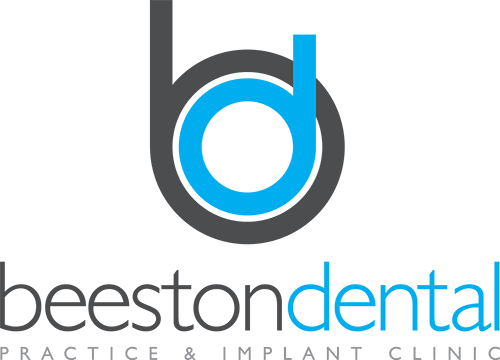
23rd November 2018
Mouth Cancer Action Month
Last year in the UK, more than 8,000 people were diagnosed with mouth cancer and globally there are in excess of 300,000 new cases every year. The disease has grown by a third in the last decade and remains one of very few cancers which are predicted to increase further in the coming years.… that’s why Mouth Cancer Action Month is so important.

What is Mouth cancer?
Most people have heard of cancer affecting parts of the body such as the lungs or breasts. However, cancer can also occur in the mouth, where the disease can affect the lips, tongue, cheeks and throat.
Anyone can be affected by mouth cancer, whether they have their own teeth or not. Mouth cancers are more common in people over 40, particularly men. However, research has shown that mouth cancer is becoming more common in younger patients and in women. Sadly, more than 1,800 people in the UK lose their life to mouth cancer every year.
What are the signs of mouth cancer?
Although risk factors (such as smoking and alcohol) are responsible for many mouth cancers, it is a disease that can affect anyone.
That is why it is so important we all know what to look out for.
- Don’t leave a mouth ulcer unattended for more than three weeks.
- Don’t ignore any unusual lumps or swellings or red and white patches in your mouth.
- Regularly check your own mouth, lips, cheeks, head and neck for anything out of the ordinary.
If you notice anything out of the ordinary, please don’t hesitate to book an appointment with your dentist or doctor. Quick action is very often life-saving.
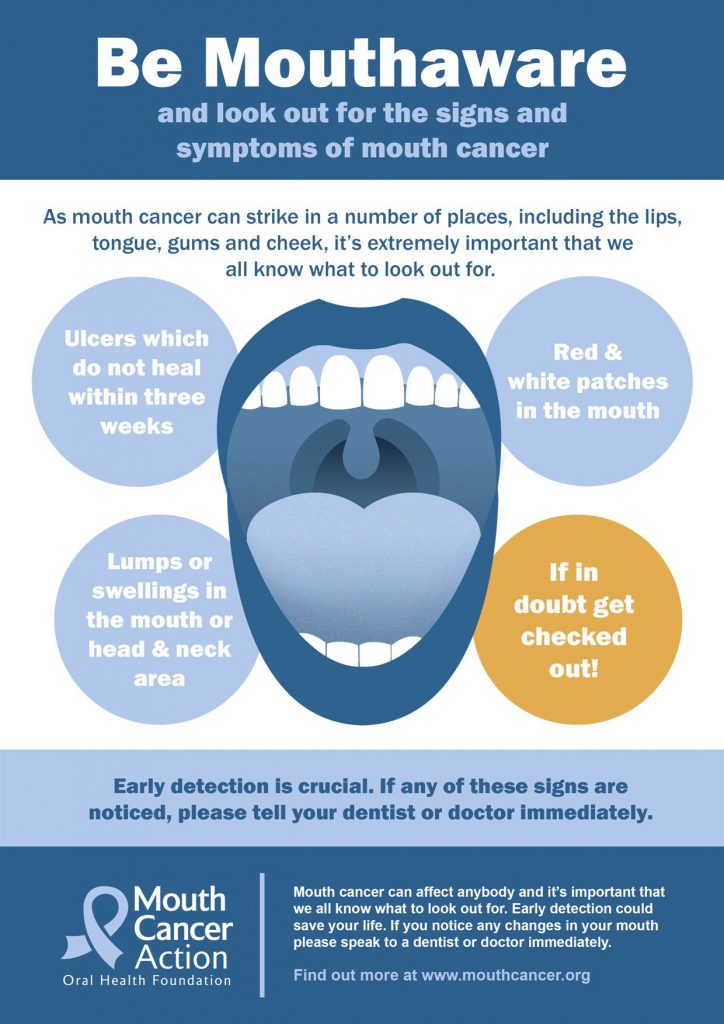
Do people die from mouth cancer?
Yes. More than 2,300 people in the UK die from mouth cancer every year. Many of these deaths could be prevented if the cancer was diagnosed early enough. As it is, people with mouth cancer are more likely to die than those having cervical cancer or melanoma skin cancer.
What can cause mouth cancer?
Around 91% of all diagnoses of mouth cancer are linked to our lifestyle and by amending these choices, we can help cut the chances of developing mouth cancer.
Most cases of mouth cancer are linked to tobacco and alcohol. Cigarette, cigar and pipe smoking are the main forms of tobacco use in many parts of the world. However, the traditional habits in some cultures of chewing tobacco, betel quid, gutkha and paan are particularly dangerous.
Alcohol increases the risk of mouth cancer, and if tobacco and alcohol are taken together the risk is even greater.
Over-exposure to sunlight can also increase the risk of cancer of the lips.
Many recent reports have linked mouth cancer to the human papillomavirus (HPV). HPV is the main cause of cervical cancer and affects the skin that lines the moist areas of the body. HPV can be spread through oral sex, and research now suggests that HPV could soon rival smoking and drinking as one of the main causes of mouth cancer. Practising safe sex and limiting the number of partners you have may help reduce your chances of getting HPV. Many people get HPV during their lives and for many this does not cause a problem. There are now HPV vaccines for both girls and boys. They were developed to fight cervical cancer, but it is likely that they will also help to reduce the rates of mouth cancer. These vaccines are given at age 12 to 13 before sexual activity starts.
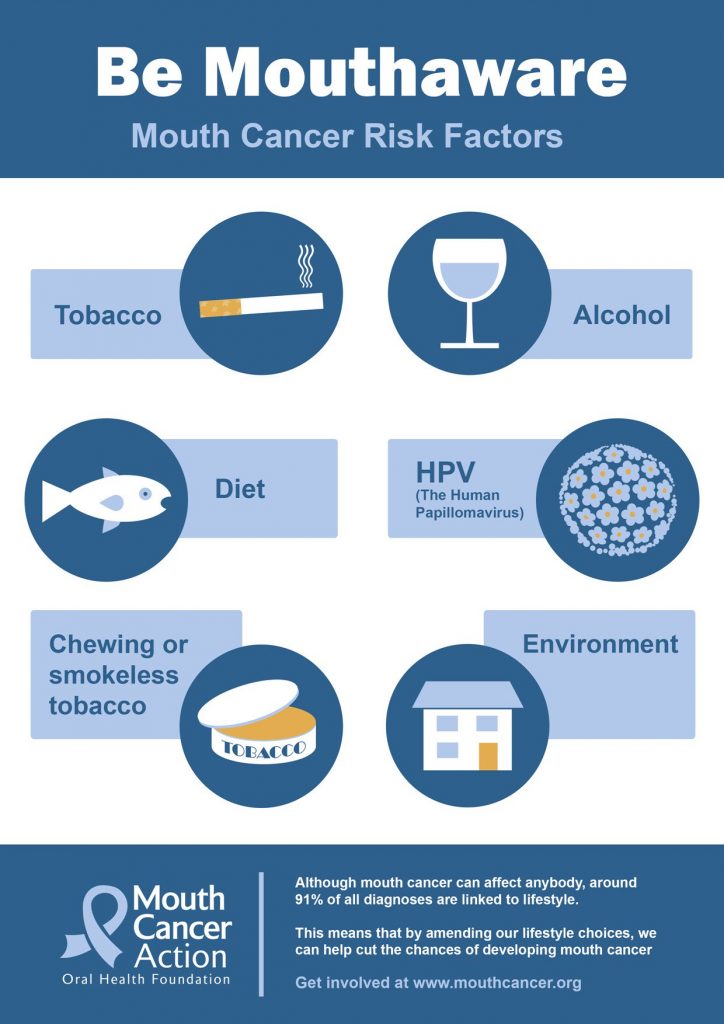
How can mouth cancer be detected?
Mouth cancer can often be spotted in its early stages by your dentist during a thorough mouth examination. Remember, your dentist is able to see parts of your mouth that you cannot see easily yourself. If mouth cancer is recognised early, then the chances of a cure are high which is why its important to keep up with regular dental appointments.
Here are the six basic areas your dentist will investigate during a normal check-up:
- Head and neck
- Lips
- Cheek’s
- Roof of the mouth
- Tongue
- Floor of the mouth
Did you know that every time you attend for a dental check up, we screen your mouth for oral cancer?
A lot of people today are aware of the general benefits of good oral health, but one benefit many people may not have considered is that regular examinations of the mouth, particularly by a dentist, could be potentially life-saving, as it can lead to the identification of the early warning signs of mouth cancer. The inside of your mouth and your tongue will be examined and we will also look at your neck and underneath your jaw. Your Dentist carries out this examination as part of your routine dental check-up. Remember, your dental team can see parts of your mouth that you cannot see easily yourself. If they find something unusual they will refer you to a consultant at a local care service, who will carry out a thorough examination of your mouth and throat. A small sample of the cells may be gathered from the area (a biopsy), and these cells will be examined under the microscope to see if its anything unusual.
If you would like any further information or are worried about any signs or symptoms, then please contact the practice on 0115 9254169.
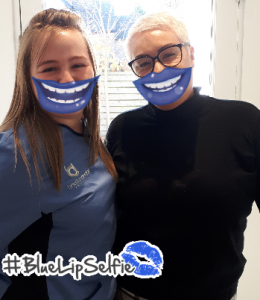
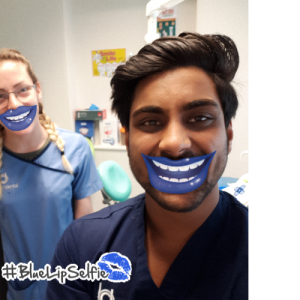
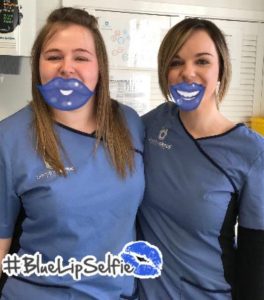
For more information, please click here to visit the Mouth Cancer Action Month’s official website to learn more about the charity and to donate. Or take a #BlueLipSelfie like some of the Beeston Dental Practice’s team to help raise awareness….
